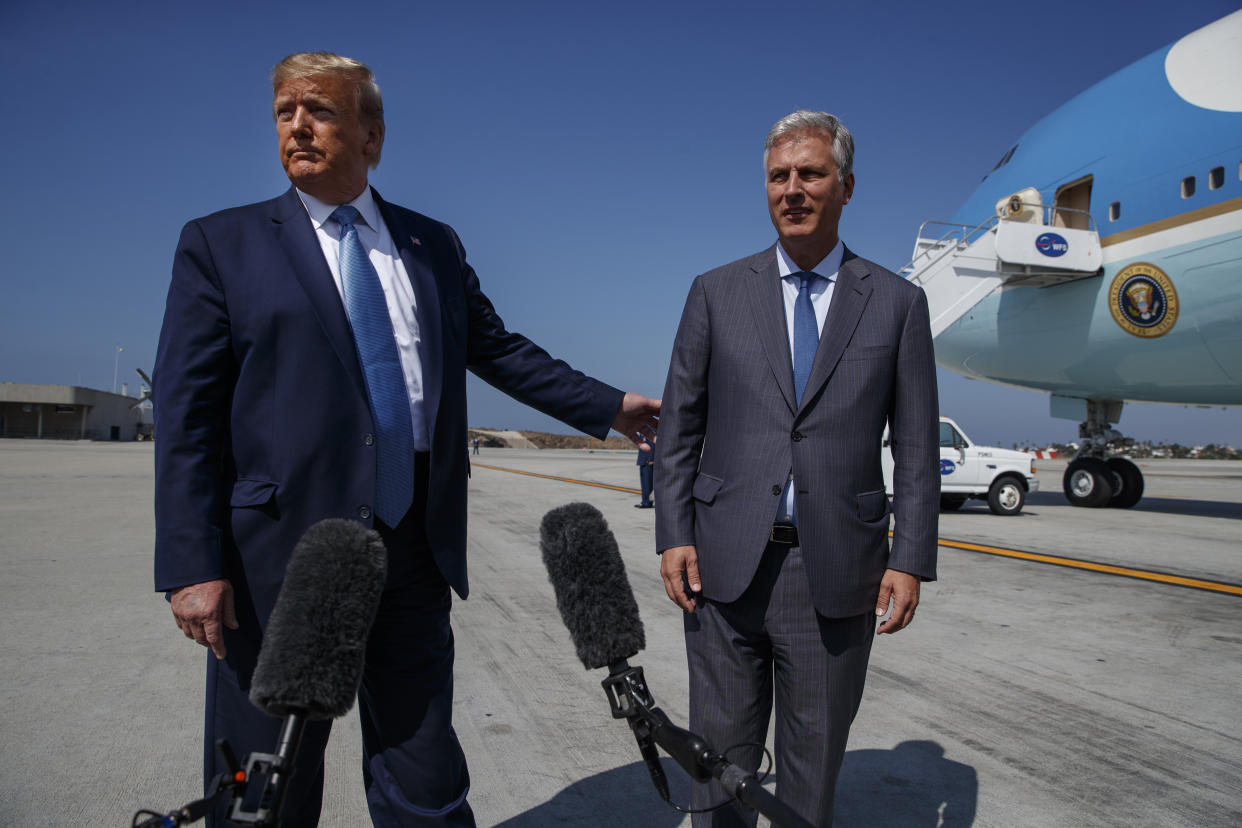Send all the Marines to the Pacific, a top Trump adviser says

- Oops!Something went wrong.Please try again later.
Donald Trump’s last national security adviser is calling on the Pentagon to deploy the “entire” Marine Corps to the Pacific as a bulwark against China’s increasing military might.
In a wide-ranging Foreign Affairs op-ed published Tuesday, O’Brien wrote that the Defense Department should consider “relieving” the Marine Corps of missions in other parts of the world, particularly in the Middle East and North Africa, in order to focus on the Pacific.
“U.S. bases in the Pacific often lack adequate missile defenses and fighter jet protection — a scandalous deficiency that the Defense Department should fix by quickly shifting resources from elsewhere,” O’Brien wrote.
O’Brien is a close Trump adviser and the op-ed could be a blueprint of Trump’s national security policy in a second term if he wins re-election. O’Brien served as national security adviser from 2019 to 2021, and is likely to be appointed to a senior post in a second Trump Cabinet.
Much of the piece focuses on China — “China” is mentioned 37 times and “Beijing” 12 times — particularly countering its expanding military influence in the Pacific.
“This morass of American weakness and failure cries out for a Trumpian restoration of peace through strength. Nowhere is that need more urgent than in the contest with China,” O’Brien writes.
In order to compete with Beijing, O’Brien urged the U.S. to build up the armed forces of its Pacific allies, devote more U.S. military resources to the region, and fix systemic problems within its own ranks.
In addition to limiting Marine deployments to the Pacific, O’Brien wrote that DOD should move one of its aircraft carriers from the Atlantic to the Pacific, and send refurbished, decommissioned Navy ships to the Philippines. Congress should also help build up the militaries of Indonesia, the Philippines and Vietnam by offering them “the kinds of grants, loans, and weapons transfers that the United States has long offered Israel,” he wrote.
O’Brien hit the Biden administration on the military’s recruiting woes, noting that last year, only the Marine Corps and Space Force met their goals. The shortfall, which DOD has attributed to a booming economy and fallout from the Covid pandemic, “speaks to a lack of confidence that young Americans and their families have in the purpose and mission of the military,” O’Brien wrote. Indeed, polls last year showed Americans’ confidence in the military was the lowest it had been in two decades.
Meanwhile, O’Brien wrote, “the military increasingly lacks the tools it needs to defend the United States and its interests.” He pointed to the fact that the Navy now has fewer than 300 ships, compared with 592 at the end of the Reagan administration. O’Brien urges Congress and the administration to “recommit” to the goal of a 355-ship Navy by 2032 — a goal he played a role in setting during the Trump administration.
DOD also needs to improve its nuclear triad, O’Brien wrote, citing China’s and Russia’s recent modernization of their own nuclear arsenals. On the U.S. side, he called for building more Columbia-class ballistic missile submarines and Virginia-class attack submarines. He also cited some analysts arguing that the Air Force needs 256 new B-21 stealth bombers.
“China has doubled the size of its arsenal since 2020: a massive, unexplained, and unwarranted expansion. The United States has to maintain technical and numerical superiority to the combined Chinese and Russian nuclear stockpiles,” O’Brien wrote, arguing that Washington needs to test new nuclear weapons in the “real world,” just not using computer models, for the first time since 1992.
O’Brien also said if China and Russia continue to “refuse to engage in good-faith arms control talks,” the U.S. needs to “resume production of uranium-235 and plutonium-239, the primary fissile isotopes of nuclear weapons.”
He also urged investing more in developing hypersonic missiles — which he specifically said a second Trump term would pursue — fixing the Pentagon’s clunky requirements and acquisition systems, and working more closely with “nimble newer defense suppliers” such as Anduril and Palantir.
O’Brien did not push for increased defense spending — in fact, he noted that spending on the Pentagon will likely decline.
“Thanks to unsustainable levels of borrowing, the federal budget will have to decline, and large increases to defense expenditures are unlikely regardless of which party controls the White House and Congress,” O’Brien wrote. “Spending smarter will have to substitute for spending more in a contemporary strategy of peace through strength.”

